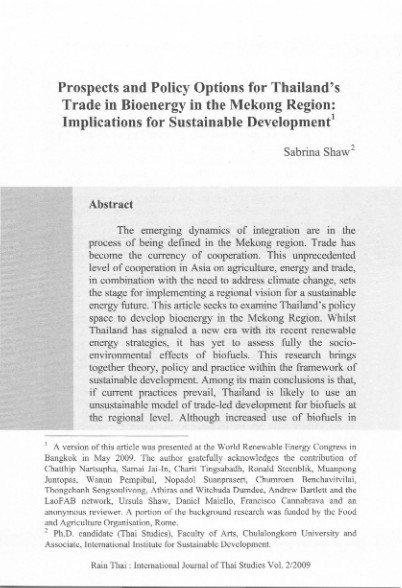Sabrina Shaw
Abstract
The emerging dynamics of integration are in the process of being defmed in the Mekong region. Trade has become the currency of cooperation. This unprecedented level of cooperation in Asia on agriculture, energy and trade, in combination with the need to address climate change, sets the stage for implementing a regional vision for a sustainable energy future. This article seeks to examine Thailand's policy space to develop bioenergy in the Mekong Region. Whilst Thailand has signaled a new era with its recent renewable energy strategies, it has yet to assess fully the socioenvironmental effects of biofuels. This research brings together theory, policy and practice within the framework of sustainable development. Among its main conclusions is that, if current practices prevail, Thailand is likely to use an unsustainable model of trade-led development for biofuels at the regional level. Although increased use of biofuels in Thailand may address immediate energy needs, it may also lead to increased food prices and encourage farmers to expand agriculture in environmentally unsustainable areas or to utilise unsustainable production methods in neighbouring Mekong countries. Use of alternative bioenergy sources may promote energy security, revitalise rural economies and reduce greenhouse gas emissions if implemented at the local community level according to the concept of Sufficiency Economy. Meeting food and energy needs in the Mekong region in the 21 st century will require a range of approaches that shift the current development paradigm to enhance the sustainability of agricultural productivity. To this end, there are significant synergies between small-scale initiatives and enhanced agro-energy sustainability.
(Published in Rian Thai: International Journal of Thai Studies, Volume 2/2009, Page 263-295)
Full Text : Download
